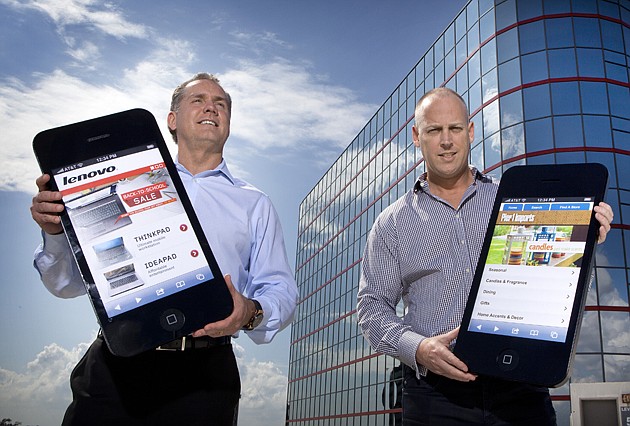Mad Mobile is living the reality of what happens when a startup launches at the nascence of a new industry that is reshaping something as gargantuan as the global retail sector.
Two years ago, Greg Schmitzer and Bruce Bennett started the Tampa-based company to create mobile websites for smart phones and tablets. The company is not an app-maker -- that's old school.
Mad Mobile makes websites optimized for mobile devices, meaning users no longer have to try to navigate tiny versions of a company's website on their phone.
But, and here is the key, the mobile websites are connected to the company's traditional website, synching data in real time so the two versions mirror each other instantly. All the sales, reviews, product changes and updates that go on at a major retailer's website flow seamlessly and immediately to the mobile site through Mad-X, the proprietary software Mad Mobile created.
With the explosion of mobile devices, mobile Web browsing has surpassed traditional desktop and laptop browsing. This mobile explosion has also reached retail.
During the 2011 holiday shopping season, 14.6% of all online sessions on a retailer's site were done from a mobile device, more than double the 5.6% from the previous year, according to research from IBM. Sales from mobile devices reached 11% in that period, compared with 5.5% in December 2010.
The result is that companies that have used Mad Mobile, and perhaps other mobile Web builders, have seen their mobile sales rocket from 5% of total sales to 25%, Schmitzer says.
And that has resulted in breakneck growth for Mad Mobile.
Two years after Schmitzer and Bennett started the company, it has 41 employees and is looking for more every day. “We're hiring like crazy,” Schmitzer says.
Sales went from $220,000 in the startup year of 2010 to $1.5 million last year and are expected to reach $6 million this year.
“This mobile wave will be enormous,” Bennett says.
Indeed. Research firm Gartner Inc. estimates that mobile payment transactions will rise from $172 billion this year to $600 billion in 2016.
Right time, right people
Schmitzer has been in the industry since 2004, which was basically the Paleolithic period for mobile retail. He was hired by Flytxt, a U.K company that wanted him to start up its U.S. operations. At the time, Europe was about two years ahead of the United States in this arena. He developed Target's mobile strategy for four years and helped build Flytxt's business.
 Bennett meanwhile has been a serial company starter. Mad Mobile is the sixth tech company he has been part of starting in Tampa. He's sold each one, two of them to major corporations.
Bennett meanwhile has been a serial company starter. Mad Mobile is the sixth tech company he has been part of starting in Tampa. He's sold each one, two of them to major corporations.
In 2010, Schmitzer and Bennett, who had worked together at Bennett's second company in the '90s, decided to start a mobile company in Tampa. Schmitzer, the president, provides the technical expertise and industry contacts and Bennett, the CEO, supplies the experience of building and growing startups.
“Apps were the hot button at the time, but we really felt like mobile Web was where the action was going,” Schmitzer says. “I saw what happened with Target's mobile site and their success with that, but at the same time I also saw that it was a major development effort for them internally, even with help.”
Schmitzer and Bennett wanted to build a company that could do it all for its clients, without involving the client's IT group. They got Tampa and Naples real estate developer John Jassy to provide seed capital and launched at the right moment.
“Our timing was really good,” Schmitzer says. Although their competitors had a head start, they were focused on using simple templates that could work across hundreds or thousands of devices. Mad Mobile zeroed in on what turned out to be the ones that really mattered.
It was at that time that the iPhone began pounding traditional cell phones, even Blackberry, with its touch screen. Then the iPad launched and Android came on the market and the dynamic changed again. Mad Mobile resides in this new dynamic.
“Suddenly the only devices that mattered were iPhone, iPad and Android devices,” Schmitzer says. “People wanted an amazing experience that worked on those devices, not a watered down one that worked on 10,000.”
And Mad Mobile was there to supply it. Schmitzer's connections made the difference, knowing the industry intimately and how to make and close a sale.
“We give an experience that converts really well into sales on those devices,” he says. “That's what our technology was designed to do, create a very interactive, very engaging experience ... and keep all the content in real time.”
'We only do big stuff'
Schmitzer and Bennett made the decision at the start of the company to focus only on big companies with big challenges for mobile retailing.
“We only do big stuff,” Schmitzer says as he tours the company's sixth-floor Westshore offices with expansive views overlooking the Tampa International Airport. The company's edge is it solves mobile problems for complex commerce sites and creates mobile buying experiences in live time — without involving the company's IT group or equipment.
The last part is a key selling point with the big retailers, who already have large amounts invested in technology divisions. Mad Mobile aggressively goes after companies on the Internet Retailer 500 list of top companies.
Schmitzer lists three reasons the company only goes after the big guys:
• Mad Mobile's technology is designed specifically for the Target-like global retail giants, operating sites that change by the minute, even the second. “That's what our technology is designed to do — solve big problems, complex problems for big companies,” he says.
• That's where the best opportunities are. “Big companies outsource more than smaller companies,” he says.
• Big retailers with major challenges are the kinds of projects on which Mad Mobile employees want to work.
So the company has hired people who know how to deal with large corporations — not just selling to them, but understanding the processes and labyrinths of a global retailer.
Once Mad Mobile has sold itself to a client, it builds the mobile website, hosts it and powers it to keep it live. Mad Mobile handles everything, leaving the retailer with few in-house headaches.
In return, Mad Mobile requires two- to three-year contracts. This is the recurring revenue sweet spot for the company because the bulk of expense is in the creation of the sites. Although there are some ongoing costs, and there are always adjustments and tweaks, this is where the company can really crank open the revenue taps.
Bennett calls this “frictionless” revenue, where money is recurring but expenses are few -- key for a fast-growing startup.
Mad Mobile expects to turn a profit by the end of this year.
A good problem
Like all startups, Mad Mobile had to overcome the reputation hurdle — being a 6-month-old company with a few employees trying to persuade major global retailers to sign on. Schmitzer's experience and contacts laid the groundwork for landing some early ones, and then coming through on promises did the rest.
“(In the) early days, it was definitely harder with only a few (clients),” Schmitzer says. Now the company has 70 clients and growing. “So we're past that hurdle. We're established.”
It's not a hard sell, Bennett says, once you show them how their traditional site looks on smart phones. “People understand very quickly and say, 'That looks like crap, I have to change that,'” he says.
Mad Mobile has three primary competitors in its space: New York City-based Useablenet, Orlando-based Kony Solutions and Austin, Texas-based Digby. Mad Mobile is the youngest and smallest, but it also is the fastest growing.
In fact, according to Internet Retailer spokesman Bill Siwicki, the company is a top vendor to the firms on the Internet magazine's mobile list. “Mad Mobile is among the top 10 mobile commerce technology vendors to the companies in the Internet Retailer Mobile 400, which will be published in October,” he says.
Although Mad Mobile is smaller than its competitors, Schmitzer says it is now able to lure clients away from the bigger companies. His explanation for it is simple: “We're able to deliver highly complex, high-quality sites faster than anyone right now, and we're signing up companies at a fast rate.”
This is reflected in the company's employee growth.
“When we moved into this office we had 15 people and it was 8,500 square feet. We could play tennis in here,” he says. Now it is approaching its maximum of 55 people and the company is looking for new digs, probably by fall.
But getting the right people can be a challenge. “Sometimes they are holed up in insurance companies, not that exciting, working on back-end systems,” Bennett says. He draws on his wide pool of contacts in the Tampa Bay market to find people. Mad Mobile has key people working at it that worked at other Bennett companies.
He says Web developers want to do cool, exciting jobs using new high-tech products. Mad Mobile offers that. And selling to large customers helps the retention process. It's fun to whip out the phone at Panera and show your friends that you built the company's mobile site. “That definitely helps,” Bennett says.
But there is a balancing act with all this growth. “You can't spend all your time hiring people and forget about your business,” Schmitzer says.
The mobile commerce industry is young, and Mad Mobile is positioned to grow rapidly with it. But the company continues to look ahead.
“We're hearing a lot about using mobile to influence in-store sales.” So the company is working on strategies for its clients that it will roll out in the fourth quarter of this year.
Bennett says they are not building Mad Mobile for a quick sale. “We're out to build a great company,” he says, although he admits things can change. But he sees Mad Mobile as a long-term proposition because the industry is so young.
“Everything is going to need to be mobilized in the next few years, whether it's customer service or intranets,” Schmitzer says. “As long as it's content that's changing all the time and being viewed on a mobile device, that's a good fit for us.”
Only the big guys
A partial list of Mad Mobile's clients include:
• Major League Baseball
• Paramount Pictures
• Slim-Fast
• Lenovo
• Sleep Number Beds
• Suzuki
• Panera
• Interstate Batteries
• Citi
• Purina
• Toshiba
• Mattel
• Ron Jon Surf Shop


 Bennett meanwhile has been a serial company starter. Mad Mobile is the sixth tech company he has been part of starting in Tampa. He's sold each one, two of them to major corporations.
Bennett meanwhile has been a serial company starter. Mad Mobile is the sixth tech company he has been part of starting in Tampa. He's sold each one, two of them to major corporations.



